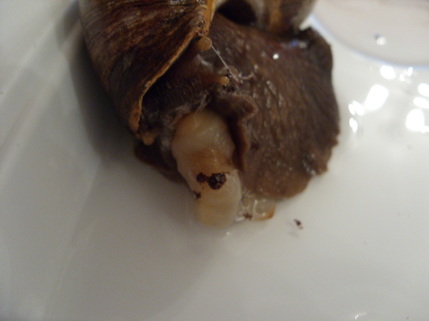Illness and injury
Unfortunately, many people are under the misconception that nothing can be done to treat a sick or injured snail. An experienced vet can provide pain relief, anti-inflammatories and antibiotics; they can anaesthetise animals, take blood samples and repair shell damage using fibreglass or epoxy resin. If your snail is ill or injured, it is vital to get them to an exotics vet immediately. This could save their life and will help to prevent them from suffering.
The information given here should be used only as a first aid response in an emergency. It is not intended as an alternative to seeking veterinary treatment.
It is a very good idea to locate your nearest exotics vet with experience of treating snails before you need them, so that you have their details readily available incase of an emergency.
Shell injuries
A snails shell protects all of their vital organs and any damage to it should be considered a serious injury. Even slight damage to the shell puts a snail at great risk of harm to their internal organs, shock, infection and loss of bodily fluids. It is essential that they receive treatment right away.
If a snails shell is damaged, they should be lifted by their body, rather than the shell. They should be carefully placed in a small carry tank with no substrate, to keep the injury as clean as possible. Provide a chunk of cucumber or a piece of their favourite food to encourage them to eat. Keep movement to a minimum and ensure that they remain moist by gently misting them periodically with cooled boiled water – use a very fine mist only, as a jet of water will cause further damage.
It is essential to get your pet to a specialist exotics vet immediately. A damaged shell may be repairable if it is treated as soon as possible. If pieces of your snails shell have come away from your snail, be sure to take these with you to the vet.
Do not try to repair the shell yourself – it is very easy to cause irreparable damage to vital organs with the sharp edge of a shell fragment.
Oral prolapse
Oral prolapses, from the mouth of a snail, typically involve the radula - the cartilagenous plate that snails use to grind their food. Healthy snails can push the radula out to a certain extent and retract it however, during a prolapse, retraction is no longer possible for the snail. In more extreme cases of prolapse, the start of the digestive tract, known as the buccal mass, may also be present. In both instances, it is essential to get your snail to an exotics vet immediately. Keep them moist, to prevent the prolapse from drying out and making retraction more difficult. Do not try to replace the prolapse yourself, as this may cause swelling and further damage.
It is vital to get them to an exotics vet straight away. An oral prolapse makes it impossible for a snail to eat. The longer they are left, the weaker and more stressed they will become, and the greater the risk of tissue desiccation or infection occurring, all of which will make recovery more difficult.
In the last two years, we have seen a significant increase in the number of snails suffering from oral prolapses. It has been suggested that an unidentified infection may be the cause and so at present, the recommended prevention is to feed only well-washed, organic produce.
First aid is to keep the prolapse moist and get the snail to an exotics vet immediately. Treatment involves replacement of the prolapse by a vet and a course of antibiotics.
N.B.
It has come to our attention that some sources recommend freezing as a 'humane' method of killing an ill or suffering snail. Ill or injured snails should be taken to an exotics vet immediately. Only on veterinary advice should the decision be made to euthanise an ill or injured animal and only a vet will be able to help them pass humanely and with minimal suffering.
First aid is to keep the prolapse moist and get the snail to an exotics vet immediately. Treatment involves replacement of the prolapse by a vet and a course of antibiotics.
N.B.
It has come to our attention that some sources recommend freezing as a 'humane' method of killing an ill or suffering snail. Ill or injured snails should be taken to an exotics vet immediately. Only on veterinary advice should the decision be made to euthanise an ill or injured animal and only a vet will be able to help them pass humanely and with minimal suffering.

